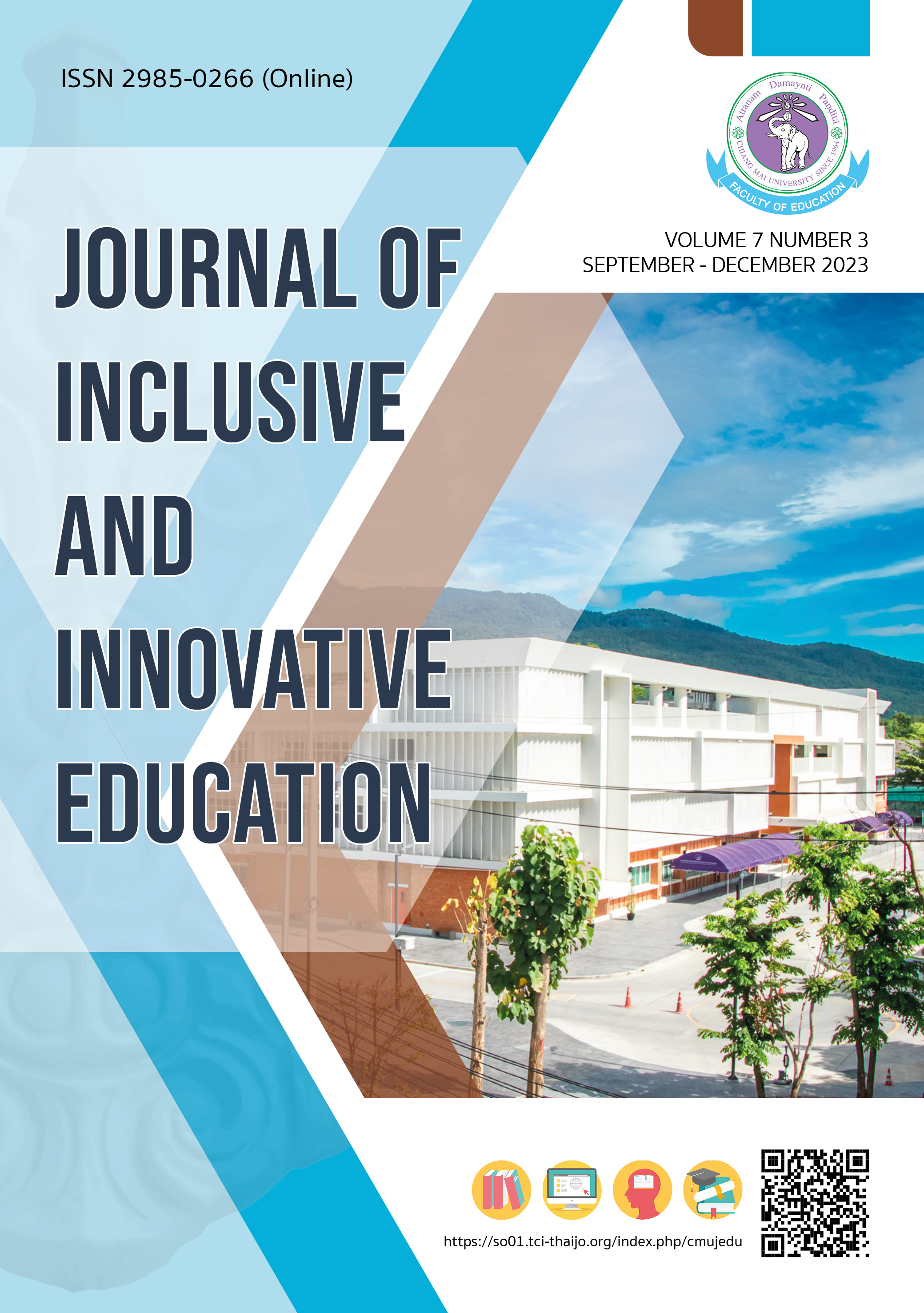รูปแบบการพัฒนาสมรรถนะการสร้างนวัตกรรมการจัดการเรียนรู้ออนไลน์เพื่อทดแทนห้องเรียนแบบเดิมของอาจารย์ระดับอุดมศึกษา
Main Article Content
บทคัดย่อ
การวิจัยนี้มีวัตถุประสงค์ (1)เพื่อวิเคราะห์สภาพ ปัญหา และความต้องการจำเป็นของอาจารย์ในการพัฒนานวัตกรรมการจัดการเรียนรู้ออนไลน์ (2) เพื่อพัฒนารูปแบบการพัฒนาสมรรถนะของอาจารย์ในการสร้างนวัตกรรมการจัดการเรียนรู้ออนไลน์ (3) เพื่อศึกษาผลการใช้รูปแบบการพัฒนาสมรรถนะของอาจารย์ในการสร้างนวัตกรรมการจัดการเรียนรู้ออนไลน์ (4) เพื่อถอดบทเรียนความสำเร็จในการพัฒนาระบบผู้ช่วยอาจารย์ในการสร้างนวัตกรรมการจัดการเรียนรู้ออนไลน์ กลุ่มเป้าหมาย ได้แก่ อาจารย์ระดับอุดมศึกษา เจ้าหน้าที่ปฏิบัติงาน และนักศึกษาเครื่องมือได้แก่ แบบสอบถามสภาพ ปัญหา และความต้องการจำเป็น รูปแบบการพัฒนา แบบประเมินคุณภาพรูปแบบ แบบประเมินสมรรถนะ แบบประเมินนวัตกรรมและแบบบันทึกการถอดบทเรียน วิเคราะห์ข้อมูลด้วยความถี่ ร้อยละ ค่าเฉลี่ย วิเคราะห์เนื้อหา ผลการวิจัยพบว่า (1) ระดับการปฏิบัติจริงการพัฒนานวัตกรรมการจัดการเรียนรู้ออนไลน์ของอาจารย์กลุ่มเป้าหมายอยู่ในระดับมากและระดับความคาดหวังอยู่ในระดับมากที่สุด เจ้าหน้าที่กลุ่มเป้าหมายปฏิบัติการสนับสนุนพัฒนาการจัดการเรียนรู้ออนไลน์อยู่ในระดับมากและระดับความคาดหวังอยู่ในระดับมาก นักศึกษาใช้คอมพิวเตอร์แบบพกพาในการเรียนออนไลน์มากที่สุด ต้องการซิมเน็ต/สัญญาณอินเทอร์เน็ตมากที่สุด และมีปัญหาการเข้าถึงอินเทอร์เน็ตมากที่สุด (2) รูปแบบการพัฒนา ประกอบด้วย 1) หลักการและเหตุผล 2) วัตถุประสงค์ของรูปแบบ 3) ขอบเขตของการพัฒนา 4) ลักษณะรูปแบบ 5) กระบวนการพัฒนา 6) บทบาทผู้ที่เกี่ยวข้อง 7) การวัดและประเมินผล และ 8) ผลลัพธ์ คุณภาพรูปแบบอยู่ในระดับมาก (3) ผลการใช้รูปแบบพบว่าสมรรถนะของอาจารย์กลุ่มเป้าหมายมีพัฒนาการเพิ่มขึ้น นักศึกษามีความคิดเห็นต่อนวัตกรรมการจัดการเรียนรู้ออนไลน์อยู่ในระดับมาก (4) บทเรียนความสำเร็จของระบบผู้ช่วยอาจารย์ ประกอบด้วย1) วิเคราะห์ต้นทุนเดิม 2) ใช้ทีมพัฒนา 3) สร้างความเข้าใจร่วมกัน 4) ทำงานร่วมกัน 5) แลกเปลี่ยนเรียนรู้ และ6) สะท้อนผล
Article Details

อนุญาตภายใต้เงื่อนไข Creative Commons Attribution-NonCommercial-NoDerivatives 4.0 International License.
หากผู้เสนอบทความมีความจำเป็นเร่งด่วนในการตีพิมพ์โปรดส่งลงตีพิมพ์ในวารสารฉบับอื่นแทน โดยกองบรรณาธิการจะไม่รับบทความหากผู้เสนอบทความไม่ปฏิบัติตามเงื่อนไขและขั้นตอนที่กำหนดอย่างเคร่งครัด ข้อมูลของเนื้อหาในบทความถือเป็นลิขสิทธิ์ของ Journal of Inclusive and Innovative Education คณะศึกษาศาสตร์ มหาวิทยาลัยเชียงใหม่
เอกสารอ้างอิง
Anderson, T. (2004). Towards a theory of online learning. Theory and practice of Online learning, 2, 109-119.
Boonmavong, D. (2022). Online Learning Behavior and Learning Outcomes of Students of Thongsuk College. Journal of Interdisciplinary Development (Humanities and Social Sciences), 1, 251 – 257. [in Thai]
Bryson, J. R., & Andres, L. (2020). Covid-19 and rapid adoption and improvisation of online teaching:
curating resources for extensive versus intensive online learning experiences. Journal of
Geography in Higher Education, 44(4), 608-623.
Buason, R. (2019). Research and Development of Educational Innovation. Bangkok: Chulalongkorn University. [in Thai]
Chung, E., Noor, N. M., & Mathew, V. N. (2020). Are you ready? An assessment of online learning readiness
among university students. International Journal of Academic Research in Progressive Education and Development, 9(1), 301–317.
Doherty, A. (1998). The Internet: Destined to become a passive surfing technology?. Educational Technology, 38(5), 61-63.
Driscoll, M. (2002). Blended learning: Let’s get beyond the hype. Retrieved from
https://www-07.ibm.com/services/pdf/blended_learning.pdf
Dulyakorn, V. (2017). Development of online video reflection model in lesson study process based on TPACK framework to enhance teachers' ICT integrated instruction ability. (Doctoral dissertation) Faculty of Education, Chulalongkorn University. [in Thai]
Ferri, F. et al. (2020). Online Learning and Emergency Remote Teaching: Opportunities and Challenges in Emergency Situations. Societies, 10, 1-18.
Haythornthwaite, C., & Andrews, R. (2011). E-learning theory and practice. Great Britain: Sage Publications.
Hengpaijit, N. (2021). Online Learning Readiness of Students at Siam University in COVID-19. (Master of
Business Administration) General Management , Siam University. [in Thai]
Intharaksa, P. (2019). Learning Management with Social Media. Journal of Education Naresuan, 21(4), 357-364. [in Thai]
Jantakeeree, T. (2022). Online Instructional Management In the Digital Era. Journal of Modern Learning Development, 7(10), 349-363. [in Thai]
Kanjanawasee, S. (2020). Modern Test Theories. Bangkok: Chulabook. [in Thai]
Khammanee, T. (2012). Teaching Science. (15th Edition). Bangkok: Chulalongkorn University. [in Thai]
Khongmhor, P. (2017). Guiding Paradigm in Online Classroom Development for RMUTT lecturer. Bangkok:
Rajamangala University of Technology Thanyaburi. [in Thai]
Laohajaratsang, T. (2018). Innovation educational information technology for Thailand 4.0. Chiang Mai: Triple 3 design. [in Thai]
Mathuros, S. (2021). Management Education Online in the NEW NORMAL COVID-19. Rajapark Journal, 15(40), 33-42. [in Thai]
Na-Songkhla, J. (2010). Design of Web-based Instruction in E-Learning System. Bangkok: Chulalongkorn University. [in Thai]
Nonthamand, N. et al. (2021). Survey of problems in organizing online teaching in general education subjects for students at the University of Phayao. Education and Communication Technology Journal, 16(20), 61-73. [in Thai]
Phakdeeteva, S. (2010). The development of the e-learning instructional design model for graduate Program of Sukhothai Thammathirat Open University. (Doctoral dissertation). Curriculum and Instruction, Silpakorn University. [in Thai]
Puwijit, C. (2021). Efficiency in Online Learning Management of Digital Age. Retrieved from
http://www.nidtep.go.th/2017/publish/doc/20210827.pdf. [in Thai]
Roslan, N. S., & Halim, A. S. (2021). Enablers and barriers to online learning among medical students During COVID-19 pandemic:An explanatory mixed-method study. Sustainability, 13(11), 1-15.
Shayna, J. (2023). The Benefits of Online Learning: 8 Advantages of Online Degrees. Retrieved from
https://graduate.northeastern.edu/resources/benefits-of-online-learning/.
Suebka, P. (2020). A new step for "STOU", year 41, leading "New Normal" to Online University. Retrieved from https://siamrath.co.th/n/156552. [in Thai]
Teerabulkul, P. (2017). Factors Influencing Intention to Reuse and Word-of-Mouth Intention of GamifiedCrowdsourcing. (Master of Science Program in information technology in Business) Faculty of Commerce and Accountancy, Chulalongkorn University. [in Thai]
Urdan, T. A., & Weggen, C. C. ( 2021). Corporate E-Learning : exploring a new frontier. Retrieved from
http://papers.cumincad.org/data/works/att/2c7d.content.pdf
Wannaprapha, T. & Todsapim, A. (2019). Online Learning Environment in 21st Century Education. e-Journal of Education Studies, Burapha University, 1(1), 1-10. [in Thai]
Wayo, W., et al. (2020). Online Learning Under the COVID-19 Epidemic : Concepts and applications of teaching and learning management. Regional Health Promotion Center 9 Journal, 14(34), 288-298. [in Thai]
Wongthongdee, S. (2016). Human Resource Development. Bangkok: Chulalongkorn University. [in Thai]
Yossomsakdi, S. (2006). Human Resource Management Principle and Concept. Bangkok: M.T. Press. [in Thai]


